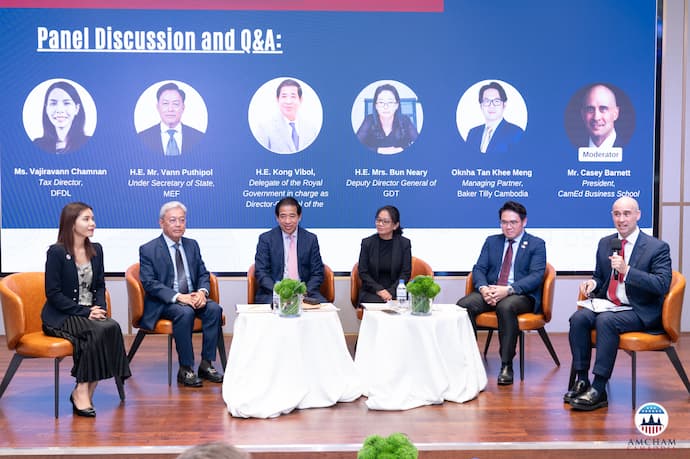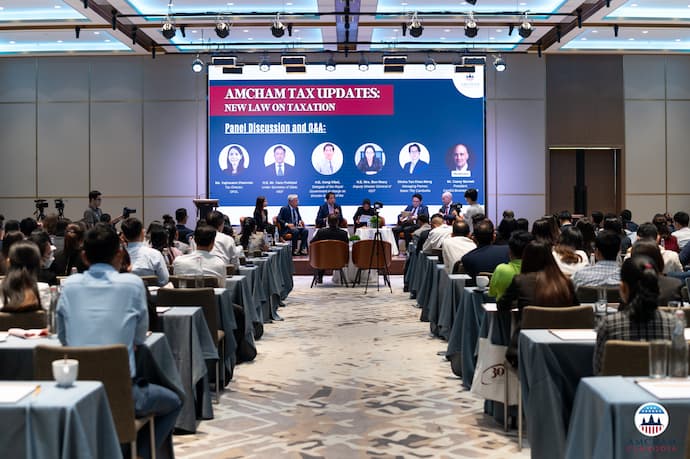The American Chamber of Commerce in Cambodia (AmCham) held an informative session in Phnom Penh to share updates on the country's new laws on taxation. Keynote speaker H.E. Kong Vibol, Director General of the General Department of Taxation (GDT), addressed 200 private sector representatives, business owners, and investors on the changes in tax laws in the Kingdom.

The conference included several speakers, including the President of AmCham Mr. Devin Barta, and officials from the Ministry of Economics and Finance (MEF). The new tax laws came into effect in May 2023 and consist of 20 chapters and 255 articles, a substantial increase from 7 chapters and 155 articles to the old law adopted in 1997.
What Are The Aims Of The New Cambodian Tax Laws?
One of the key aims of the new tax laws and their implementation would be to promote a fair playing field. “I will not allow non-compliance to kill the compliance,” added H.E. Kong Vibol, and the GDT would be targeting tax evaders.
Vibol told the audience that the new laws shouldn't increase the tax paying burden but to provide clarification on taxes, combining the old laws and Prakas into a new set aligned with feedback from discussions and seminars held with working groups, the private sector and relevant ministries. He added that the new laws don’t increase taxes and that the tax laws will keep evolving as they have, and the new comprehensive laws will make it easier for everyone, including the private sector, to understand what is required. The Director General of the General Department of Taxation also added that the laws are being translated into English, Japanese and Chinese.
Vibol reminded guests that when the Law on Taxation was introduced initially a decade ago, the Cambodian government was only able to collect around USD $700 million, but by 2024, the Ministry of Economy and Finance estimated annual tax collection of $4.16 billion.
It was also commented that the new macro policy is intended to protect growth and that even though Cambodian Gross Domestic Product growth has been lowered in 2023, the forecast for tax collection targets has not dropped.
Devin Barta, President of the American Chamber of Commerce, said that the new tax laws would elevate the business environment in the country; "Businesses benefit from what these tax laws provide for: the roads that people can travel on, the ports that move raw materials in, and move our finished goods out," he said.
"There are many businesses that may have issues with tax overall. They are a necessary part of the functioning of the economy, the one in which we all operate, thrive and enjoy. Businesses having legitimate concerns, generally in the realm of uncertainty,” Barta added. "Our forecasts and budgets do not like uncertainty... uncertainty makes us pause and think about investment," he continued. "Yet, this new tax law helps to add certainty.”
What Cambodian Tax Laws Have Changed?
The core definition of the new laws remains the same, however, changes were made to the permanent establishment (PE) and agency definitions as well as Anti-Avoidance Laws. This AmCham event allowed attendees to ask questions and clarify rules regarding Permanent Establishment (PE), Value Added Tax (VAT), withholding tax, and public lighting tax.
- Permanent Establishment (PE) - The law contains a provision that allows individuals to create PE on behalf of a non-resident in Cambodia.
- Anti-Avoidance Laws - Granted broad powers to the tax authorities to combat tax avoidance known as General Anti-Avoidance Rule (GARR). The Tax Laws in Article 194 provides power to the tax authority to: “Reject and/or re-determine the real elements of any transactions if it is found that the taxpayer has prepared or had any transactions that represent a false or unreal intention to reduce or eliminate the tax payable contrary to the intention of the tax provisions”.

Oknha Tan Khee Meng, Managing Partner of Baker Tilly Cambodia, praised the achievement of the General Department of Taxation (GDT) for the new laws and the improved tax collection in general. Meng also reminded taxpayers to be mindful to ensure compliance with the definitions of Permanent Establishment (PE), capital gains tax, VAT on e-commerce, public lighting tax and tax audits and encouraged the use of digital payments to pay taxes.
Legal firm DFDL outlines here some of the new Taxation Law crimes which are detailed with the applicable fines.
According to the GDT presentation, the aim of the new law is to maintain tax revenue collection, offer a level playing field, social equity, and strengthen the quality of taxpayer services in accordance with Public Financial Management (PFM) and Revenue Mobilisation Strategy (RMS). The law is seen as an improvement of the old laws and regulations and will better facilitate, fill in the gaps, and ensure consistency with five main objectives:
- To compile existing laws and regulations;
- To modify and fulfil the gaps in implementing tax regulations;
- To introduce flexibility in implementing the government's tax incentive policy;
- To enable participation in the implementation of digital economics and social policy framework of Cambodia, and
- To ensure consistency in both forms and substance in line with relevant laws.
Mr. Casey Barnett, founder of CamEd Business School and a moderator at the event, said that this law makes it easier for people to learn about taxes. “This new law on taxation brings together dozens of amendments, definitions, and regulations into a single document, and as a teacher, I appreciate having a single reference - for those who wish to learn about tax, it is now much easier,' he said."